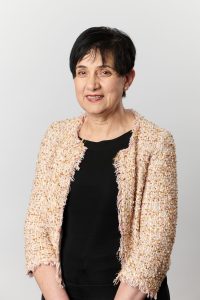Multicultural connections run deep
A passion for refugees, migration and multiculturalism has led former academic and community sector leader Vanda Fortunato to become the new Chair of the Board of migrant and refugee settlement agency AMES Australia.
Dr Fortunato also has deep personal connection with the organisation, which supported her late father when he was a new migrant.
“I’m very passionate about refugee settlement and multiculturalism as a first generation Australian whose parents came from Italy,” she said.
“I never knew or thought about how my father learned English, but he obviously had.
“After my father died, I found all the English workbooks he had when he studied with the Adult Migrant English Service, which of course became AMES.
“When I saw the role of Chair at AMES come up, I thought it would be wonderful to part of the organisation that supported my father; and it would be a privilege and an honour to be part of an organisation supporting people settling in Australia,” she said.
 Dr Fortunato began her professional career as a sports psychologist at Victoria University’s School of Human Movement.
Dr Fortunato began her professional career as a sports psychologist at Victoria University’s School of Human Movement.
Since then, she has had a twenty-plus year career in executive and strategic leadership across both domestic and international organisations.
Her extensive expertise spans various sectors, including: public and private health, primary care, non-profit organisations, medical education, academia, pharmaceuticals, health insurance, and consultancy.
She has been CEO for two prominent non-profit entities. Furthermore, her professional journey encompasses pivotal senior executive positions within a Private Equity Firm, Medibank, a clinical research organisation and Accenture.
Dr Fortunato has also made impactful contributions during her tenure at institutions such as the World Bank and the Asian Development Bank.
Presently, Dr Fortunato also serves as the Chair of the Board for the Southern Metropolitan Cemeteries Trust and Early Childhood Management Services. She also holds the position of Deputy Chair at Integrated Living and is a board member at BreastScreen Victoria and Vasey RSL Care.
Dr Fortunato said that being the daughter of migrants and having lived overseas has given her insights into the difficulties people can face when settling in a new country.
“I’ve lived in different countries so I’ve seen how difficult it can be to settle in a new place,” she said.
“I’ve seen how difficult it can be for people sitting on a tram and not knowing what the people around them are saying; this speaks to how difficult it can be for migrants and refugees navigating a new society.
“And to me, the work of AMES is at that intersection of people keeping their own culture alive but also becoming active participants in their new environment.”
Dr Fortunato said growing up in a multicultural communities gave her a sense of the value of diversity but also kept her slightly insulated.
“Until I was 13, I assumed everyone was Catholic and everyone spoke another language. I grew up and lived in multicultural communities in Brunswick and Sorrento. Everybody’s parents spoke two languages and we all went to the same schools.
“We’ve seen that some groups of migrants have not felt as welcome or as comfortable as we might like. But we’ve also seen the cultural richness and economic contributions migrants and refugees have made.
“So, multiculturalism in Australia is still a work in progress and something to be nurtured.”
Dr Fortunato said she was looking forward to making a contribution to AMES and the work the organisation does.
“I hope to see AMES working around Australia supporting people who are settling here. And I want to see AMES innovating and looking at different ways of doing things,” she said.
And she sees a future for AMES working with Indigenous people and communities.
“One challenge we have in Australia is that we’ve never really embraced indigenous culture,” Dr Fortunato said.
“I think this is a space where AMES could have an impact; and it’s increasingly important, especially in the wake of the recent Voice referendum result.
“I was recently at a meeting with a New Zealand government ministry and the meeting opened with a statement in the indigenous Maori language. We can learn a lot from our cousins across the Tasman.
“We have failed our first nations’ peoples by not embracing and valuing their cultures. I would like to see AMES doing more in this space.
“I guess the question is: how do we pivot as an organisation to do more of the work that is desperately needed.
“I want to see AMES continue to be an iconic organisation that does vital settlement, education, training and development work across the country,” Dr Fortunato said.












